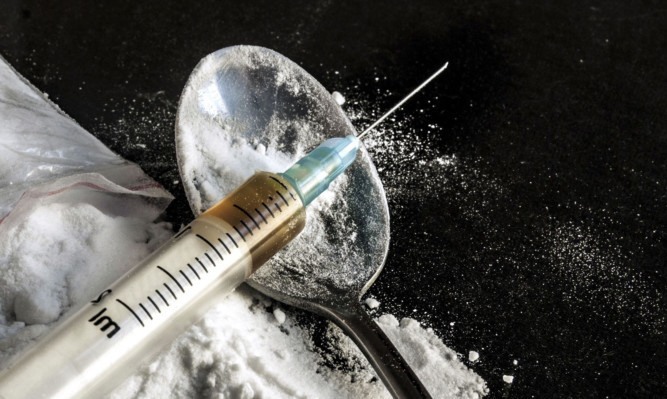Tayside drug addicts are being brought back from the dead by their loved ones when they overdose.
The head of a local drugs partnership said lives are being saved because family members are being given training in how to use a heroin overdose reversal kit.
When users take too much of any opiate, they nod off, and from one to three hours later lose the will to breathe.
When Naloxone known as Narcan is administered, it removes the heroin from their receptors and blocks the drug’s effects for 30 to 90 minutes.
Victims should still go to hospital, but those 30 to 90 minutes are enough to save someone’s life.
“Undoubtedly, lives are being saved due to this training,” said Eric Knox, chairman of Angus Alcohol and Drugs Partnership.
“The training is freely available to carers and family members via Tayside Substance Misuse Service or the Harm Reduction Clinics in Angus.
“The training is vital to enable individuals to have the confidence to recognise the signs of overdose and to address them and ultimately to potentially save a life.”
Overdoses often occur when friends or family are near at hand and they are being trained in how to manage such an emergency and keep the victim alive while waiting for the ambulance.
Mr Knox said: “As part of the response to drug deaths, services in Angus are encouraging people at risk to receive training about how to prevent overdose as well as basic life support information.
“Following training, Naloxone, a potentially life-saving drug, that can temporarily reverse the symptoms of overdose, can also be issued to those most at risk.
“Concerned family members and carers can also receive overdose training and can be supplied with Naloxone, with the consent of the person at risk.
“If someone has overdosed on opioids, Naloxone can help prevent death by removing the opioids from the opioid receptors in the brain for a short period, allowing valuable time to call an ambulance. Naloxone is easy to administer, harmless to others and works very quickly.”
In 2013, 34 people died across Tayside as a result of drugs eight in Angus.
“Every drug death is a tragedy for the individuals and the friends and relatives that are left behind,” said Mr Knox.
“The Angus Alcohol and Drug Partnership is working very hard to reduce the number of deaths by early intervention, harm reduction, prevention and enforcement strategies along with an established treatment pathway.
“We have to realise that drugs like heroin are dangerous and can kill and that’s why they are controlled.
“Serious and Organised Crime Groups are making millions out of other peoples’ misery. We are focused on individuals’ recovery and for us every death is one too many.”
Angus ADP, in partnership with colleagues from Dundee ADP and Perth and Kinross ADP, has developed an action plan for preventing drug-related deaths.
This work is based on a multi-agency review group and the associated annual report that is produced by colleagues from NHS Tayside Public Health.
Mr Knox said Angus ADP is fully committed to preventing drug-related deaths and local statistics support the national position that those most at risk are older drug users with established patterns of drug use.”
